北师大版英语八年级上册《An Interview on TV 》课件PPT模板
初中英语北师大版八年级上册《Unit 1 Lesson 2 An Interview on TV-
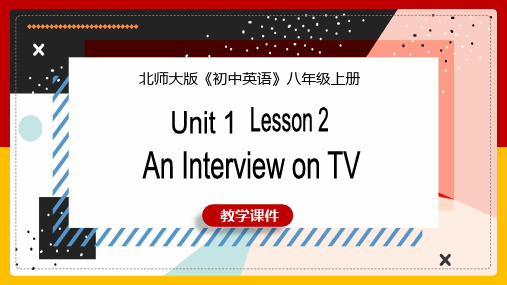
北师大版《初中英语》八年级上册 教学课件
What did he do yesterday?
Did he …? Yes, he did. No, he didn’t.
What did he do yesterday? He played football yesterday.
What did she do last weekend?
Did she…? Yes, she did. No, she didn’t.
Was he …?
Yes, he was. No, he wasn’t.
He was in the classroom just now.
动词一样过去时,表示过去产生事; be用was或用were, have, has变had; 谓语动词过去式,过去时间坐标志; 一样动词加-ed,若是特别得硬记。 否定句很简单,主语之后didn’t添; 疑问句也不难,did放在主语前; 如果谓语之前有did,谓语动词需还原; 动词若是was, were,否定就把not添。
1.外加助动词did后,动词须返回原形。
Did he went to school yesterday? ×
Did he go to school yesterday?
2.简略回答用助动词did/didn’t代替行动动词。
Did he find the boyபைடு நூலகம்yesterday? -Yes, he did. -No, he did not (didn’t).
fell wrote was/were
行动动词一样过去时的疑问式
1. 一样过去时的一样疑问式在句首加助动词did:
Did+主语+动词原形……?
北师大版八年级英语上册Unit 1 Lesson 2 An Interview on TV教案

Unit 1 Lesson 2 An Interview on TV 教案Teaching aims:1. 让学生了解语言学习的现状及重要性。
2. 进行课堂听力训练,提高学生英语听力能力。
3. 将课文主题与生活紧密联系,培养学生在生活中学习英语、运用英语的能力。
4. 通过学习让学生能够熟练运用一般过去时的一般疑问句与答句的表达。
Key points:重点学习一般过去时的一般疑问句与答句。
Difficult points:引导学生在活动中、生活中灵活运用句型,培养学生英语听、说能力。
Teaching preparations:PPT, cards, pictures, recorder.Teaching procedures:Step 1: Warm-up1. Greeting:T: Good morning, girls and boys. What TV programmes did you watch last night?2. Lead-inLook at the key words. Choose the correct words to complete the sentences on the right. Key Words: Language learningcharacters conversation grammarlistening passage pronunciationreading speaking vocabulary writing1) She speaks English very well. Her is quite good.2) He is learning to write Chinese .3) Sometimes rules are hard to remember.4) I just read an interesting in an old book.5) We had a long about the interview on the internet.Step 2: Listening1. Listen to the first part of the interview and answer the question.1) When did Tina come to Beijing?2) Did Tina like her teacher?3) What did Tina do in her Chinese class?2. Listen to the second part of the interview and complete the notes about James.3. Listen to the whole interview and write Tina, James or Tina &James in each blank.Step 3: Grammar1. Look at the table and circle the correct words.2. Pair work: make yes/no questions about James. Ask and answer in pairs. Example:A: Did he see a Chinese book in his cousin’s room?B: Yes, he did.Step 4: SpeakingT: Work in pairs. Talk about your own English learning experience.-When did you begin learning English?-What did you do in your English class?-What did you do after class?-What helped you learn English?Example:A: In English class, I usually listen to the teacher carefully. B: Me too. Taking notes is also very important.Step 5: Homework1. Memory all the key words and expressions.2. Talk about your opinion on language learning.。
初二英语(师大版)U1 Lesson 2 An Interview on TV 1

Listen to the second part of the interview and complete the notes.
1. When did Tina come to Beijing?
2. Did Tina like her teacher?
3. What did Tina do in her Chinese class?
1. When did Tina come to Beijing?
Listen and answer the questions.
interview
n. 访谈;采访
conversation n. 交流,谈话
Do you like watching TV?
People also share their experience about learning grammar, pronunciation and vocabulary.
U1 Lesson 2 An Interview on TV 1
初二年级 英语
Do you like watching TV?
I like watching interviews about English learning. People usually have conversations in the program.
James—Learning Chinese Reason
Learning In the US: experience
新北师大版八年级英语上册Unit 1 Television Lesson 2 An Interview on TV 第1课时精品课件
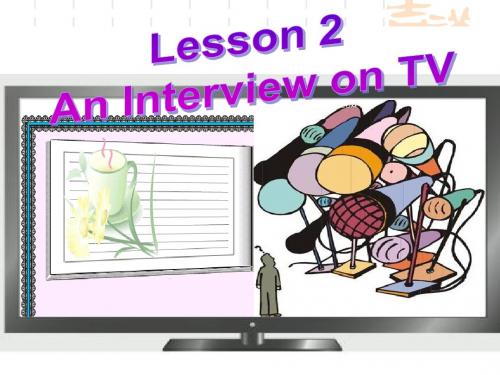
simple conversations
Chinese writing
Listening 2
Reason
Chinese characters looked interesting.
In the US enjoyed Chinese class, ________ helped him ________ grammar understand Chinese pinyin, _________, pronunciation and simple conversations In China learn to read long passages and ____________ Chinese characters
2. What are they talking about? A. Their learning experience B. Their language C. Their English learning
Listen and write Tina, James or Tina & James in each blank.
1. _____ Tina didn’t speak any Chinese before 2008. Tina learned some Chinese from 2. _____ games and TV. 3. James ______ began learning Chinese at university. 4._____________ Tina & James think(s) Chinese writing is difficult.
Listening 1
1. When did Tina come to Beijing? In 2008. 2. Did she know any Chinese before coming to China? No. 3. What did she do in her Chinese class?
2019秋北师大版英语八上Lesson2AnInterviewonTV

characters
grammar
conversation listening
passage
pronunciation
reading
speaking
vocabulary
writing
Read the sentences and guess the meaning of the underlined
interesting TV programmes.
Listen to the second part of the interview and complete the notes.
Listen to the second part of the interview and complete the notes.
was
ten
saw was
saw
looked
began learning
at
the US
Then went
didn’t
use
enjoy
helped
understand
grammar
conversations
learning
passages
learn
Chinese characters
takes
practice
changing the form of words and joining them into sentences.
段落 4. Here are four passages in the text. Let’s read them together.
发音
5. Her pronunciation is very wonderful. Let’s follow her to read the
最新北师大版八年级英语上册课件:Unit 1 Television Lesson 2 An Interview on TV 第2课时

最新初中英语精品课件设计
肯定句
否定句
Germany scored The English team in the first half. didn’t score.
+动词过去式
didn’t+动词原形
一般疑问句 Did Tina like her teacher?
Did
最新初中英语精品课件设计
4 James didn’t use Chinese for many years. _W__h_o_d_i_d_n_’_t_u_s_e_C__h_in_e_s_e_f_o_r_m__a_n_y__y_e_a_rs_?
-When did you begin learning English? -I began learning English… -What did you do in your English class? -I… -What did you do after class? -I… -What helped you learn English? -…helped me learn English.
4. Did he enjoy his Chinese class? Yes, he did.
7 Write wh-questions about the underlined words.
1 Tina came to Beijing in 2008. _W__h_e_n_d_i_d_T__in_a__c_o_m_e__to__B_e_i_ji_n_g_?
6. Make yes / no questions about James.
Example
1. see a Chinese book in his cousin’s room?
最新北师大版八年级英语上册课件:Unit 1 Television Lesson 2 An Interview on TV 第1课时
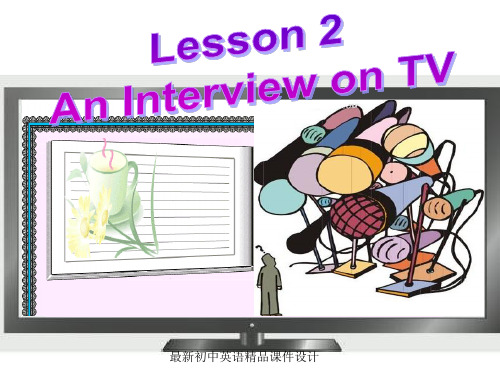
Chinese pinyin grammar pronunciation
long passages Chinese characters
simple conve最rs新a初t中io英n语s精品课件设C计hinese writing
Listening 2
3. What did she do in her Chinese class?
listening writing reading speaking played games watched TV
4. Did she like her teacher?
Yes.
最新初中英语精品课件设计
Listening 2
1. _T_in_a__ didn’t speak any Chinese before 2008.
2. _T_in_a__ learned some Chinese from games and TV.
3. J_a_m__e_s_ began learning Chinese at university.
They are learning Chinese.
2. What are they talking about? A. Their learning experience B. Their language C. Their English learning
最新初中英语精品课件设计
Listen and write Tina, James or Tina & James in each blank.
4._T_i_n_a_&__J_a_m__e_s_ think(s) Chinese writing is diffic源自lt.最新初中英语精品课件设计
北师大版英语八上 Lesson 2 An Interview on TV 第一课时说课稿

北师大版英语八上 Lesson 2 An Interview on TV 第一课时说课稿一. 教材分析北师大版英语八上Lesson 2 An Interview on TV是一篇关于电视采访的文章。
通过一篇电视采访,让学生了解一位成功的科学家,激发学生学习英语的兴趣。
本课主要学习采访的一般疑问句和回答,以及一些与职业和兴趣相关的词汇。
教材内容丰富,贴近生活,有利于学生提高英语实际应用能力。
二. 学情分析考虑到学生已经掌握了基本的英语语法和词汇,具备一定的听说读写能力。
但在实际应用中,学生对于日常交流中的口语表达和听力理解仍有困难。
因此,在教学过程中,需要注重培养学生的口语表达能力和听力理解能力。
三. 说教学目标1.知识目标:学生能够掌握采访的一般疑问句和回答,以及与职业和兴趣相关的词汇。
2.能力目标:学生能够流利地朗读课文,提高听力理解能力,能够用英语进行简单的日常交流。
3.情感目标:通过学习课文,激发学生对英语学习的兴趣,培养学生的团队协作精神。
四. 说教学重难点1.重点:采访的一般疑问句和回答,与职业和兴趣相关的词汇。
2.难点:学生能够运用所学知识进行日常交流,提高听力理解能力。
五. 说教学方法与手段1.采用任务型教学法,让学生在完成任务的过程中,自然而然地学习英语。
2.利用多媒体教学手段,如课件、视频等,提高学生的学习兴趣。
3.分组讨论,培养学生的团队协作精神。
六. 说教学过程1.导入:通过提问方式引导学生思考采访的意义和目的,激发学生学习兴趣。
2.呈现课文:播放课文视频,让学生初步感知课文内容。
3.朗读课文:学生跟读课文,模仿语音语调,提高口语表达能力。
4.学习词汇:学生自主学习与职业和兴趣相关的词汇,进行小组讨论。
5.理解课文:学生回答关于课文内容的问题,提高听力理解能力。
6.实践环节:学生分组进行角色扮演,模拟采访过程,巩固所学知识。
7.总结:教师引导学生总结本节课所学内容,检查学习效果。
北师大版英语八年级上册《 Last Week on TV 》课件PPT模板

Vocabulary
Find adjectives ending in “-ing” form on page 6 and complete the table.
“-ed” form
bored interested excited
“-ing” form
boring interesting exciting
添加标题内容 please add the title here
第二章
新知导入
添加标题内容 please add the title here
Warm up
Talk about TV programs.
添加标题内容 please add the title here
Did you watch any interesting programs during your vacation?
第一章
学习目标
添加标题内容 please add the title here
学习目标
1. Learn about the use of participle adjectives (-ed and -ing forms).
2. Learn about simple past tense. 3. Talk about a TV program.
People
TBC
What was it about?
an important game between England and Germany
What did the reviewer think?
It was boring.
about a great mother who It was moving. adopted twelve deaf children
Unit1 lesson2 课件2022-2023学年北师大版英语八年级上册

过去式动词的变化
规则变化 (regular change)
1、一般加ed : visit — visited 2、以e结尾的加d: dance — danced 3、以辅音字母加y结尾的改y为i加ed:
study — studied 4、以辅元辅结尾的重读闭音节,双写末 尾的辅音字母加ed: stop — stopped
bought
sang heard made found broke
thought
fell wrote was/were
翻译句子
1. 我上周去看爷爷奶奶了。 I visited my grandparents last week.
2. — 你的弟弟踢足球了吗?— 他没踢。 — Did your brother play football? — No, he didn’t.
James - Learning Chinese
Reason
A book, Chinese characters
Learning experience
In the US: In the university, Chinese class ……
In China: He lives in Beijing now and learns Chinese.
7. call called 17. see saw
8. eat ate
18. put put
9. want wanted 19. read read 10. are were 20.take took
21.buy 22.sing 23.hear 24.make 25. find 26.break 27.think 28.fall 29.write 30.be
初中英语北师大版八年级上册《Lesson 2 An Interview on TV 》课件

Reason
Chinese characters looked interesting.
Learning experience
In the US
e_n__jo_y_e_d__ Chinese class, __h_e_l_p_e_d_ him understand Chinese pinyin, _g_r_a_m__m_a_r_, pronunciation and simple
Discussion
What do you think is difficult about learning a language? Have a discussion with your partner, using the key words.
grammar
pronunciation
listening
James—learning Chinese
Reason
Chinese characters looked interesting.
Learning experience
In the US: enjoyed it, helped him understand pinyin, grammar, pronunciation and simple conversations;
Warm up
Is learning a language difficult?
Look at the key words. Listen and read.
Key words: Language learning characters, conversation, grammar, listening, passage, pronunciation, reading, speaking, vocabulary, writing
北师大版英语八上《Lesson 2 An Interview on TV》ppt课件

6. Make yes / no questions about James.
Example
1. see a Chinese book in his cousin’s room?
A: Did he see a Chinese book in his cousin’s room? B: Yes, he did.
2. learn Chinese in high school? 3. go to university? 4. enjoy his Chinese class?
2. Did he learn Chinese in high school? No, he didn’t. 3. Did he go to university? Yes, he did. 4. Did he enjoy his Chinese class? Yes, he did.
一般疑问句 Did Tina like her teacher?
Did +动词原形…?
Did?
Did you enjoy it?
When did you come / came to Beijing? When did you come to Beijing?
Did you enjoy it?
肯定句
否定句
Germany scored The English team in the first half. didn’t score. +动词过去式 didn’t+动词原形
一般疑问句 Did Tina like her teacher?
Did +动词原形…?
3 James went to university in the US. Where did James go to university _______________________________? 4 James didn’t use Chinese for many years. Who didn’t use Chinese for many years __________________________________?
北师大版英语八年级上册Unit1Lesson2AnInterviewonTV(第二课时)优秀教学案例

1.在整个教学过程中,我将提出一系列与电视采访相关的问题,引导学生进行思考和讨论。例如,采访问题的设计原则是什么?如何在采访过程中进行有效的沟通?中西方采访文化有哪些差异?
2.问题导向的教学策略能够激发学生的思维能力,培养他们解决问题的能力,并且能够使学生更加专注和投入于课堂学习中。
(三)小组合作
(二)讲授新知
1.在学生对电视采访有了初步了解后,我将开始正式讲授电视采访的基本知识和技巧。
2.我会通过讲解和示例,向学生介绍采访问题的设计原则、采访过程中的沟通策略、中西方采访文化的差异等核心知识点。
3.同时,我会结合实例和案例,让学生更加直观地理解和掌握电视采访的技巧和方法。
(三)学生小组讨论
1.在讲授完新知识后,我将组织学生进行小组讨论,让学生围绕电视采访的相关话题进行交流和分享。
北师大版英语八年级上册Unit1Lesson2AnInterviewonTV(第二课时)优秀教学案例
一、案例背景
北师大版英语八年级上册Unit1Lesson2《AnInterviewonTV(第二课时)》优秀教学案例,是基于学生在第一课时对电视采访的基本知识和技巧有了初步了解的基础上进行授课。本课时主要引导学生通过观看、分析和实践电视采访,提高学生的听说能力和实际操作能力,培养学生的跨文化交际意识。
(二)过程与方法
1.学生将通过观看、分析和讨论电视采访视频,掌握电视采访的基本知识和技巧。
2.学生将通过小组合作完成一次模拟采访,提高实际操作能力和团队协作能力。
3.学生将通过对比中西方采访文化的差异,增强跨文化交际意识。
(三)情感态度与价值观
1.学生将通过对电视采访的学习和实践,培养对英语学习的兴趣和自信心。
北师大版英语八上Unit 1 Lesson 2 An Interview on TV (第2课时)教

北师大版英语八上Unit 1 Lesson 2 An Interview on TV (第2课时)教学设计一. 教材分析北师大版英语八上Unit 1 Lesson 2 An Interview on TV 主要讲述了一位著名篮球运动员接受电视采访的故事。
通过这个故事,学生可以学习到如何描述一个人的外貌、性格和兴趣爱好的一般现在时态。
本课内容与学生的生活紧密相连,易于引起他们的学习兴趣。
教材内容由浅入深,循序渐进,有利于学生掌握知识点。
二. 学情分析学生在学习本课之前,已经掌握了如何用英语进行自我介绍和描述他人的基本方法。
他们对篮球运动有一定的了解,因此能够更好地理解课文内容。
同时,学生对本课的主题感兴趣,有助于提高他们的学习积极性。
三. 教学目标1.知识目标:–学会描述一个人的外貌、性格和兴趣爱好。
–掌握一般现在时态的运用。
–了解篮球运动的相关知识。
2.能力目标:–能够流利地朗读课文,并进行角色扮演。
–能够用英语进行有关篮球运动的对话。
3.情感目标:–培养学生对篮球运动的热爱,增强团队精神。
–培养学生积极乐观的人生态度。
四. 教学重难点•描述一个人的外貌、性格和兴趣爱好。
•运用一般现在时态进行描述。
•一般现在时态的运用。
•篮球运动相关词汇的掌握。
五. 教学方法1.情境教学法:通过设定篮球比赛的情景,让学生在实际语境中学习英语。
2.交际法:引导学生进行篮球主题的对话,提高他们的口语表达能力。
3.任务型教学法:通过完成篮球比赛相关的任务,培养学生合作学习的能力。
六. 教学准备1.教师准备:–篮球比赛的图片或视频。
–篮球运动的相关资料。
–课文录音带。
2.学生准备:–预习课文,了解篮球运动的基本知识。
–复习一般现在时态的用法。
七. 教学过程1.导入(5分钟)教师通过展示篮球比赛的图片或视频,引起学生的兴趣。
提问学生:“Do you like basketball? Why?”,让学生发表自己的看法。
2.呈现(10分钟)教师播放课文录音带,让学生跟读。
北师大版八年级英语上册课件:Unit 1 Television Leview on TV 第1课时
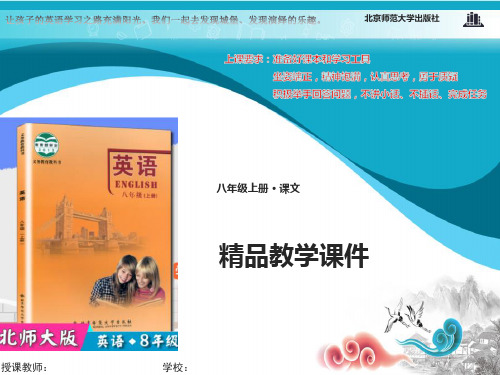
simple conversations Chinese writing
Listening 2
Reason Chinese characters looked interesting.
In the US _e_n_j_o_y_e_d_ Chinese class, __h_e_lp_e_d__ him understand Chinese pinyin, _g_r_a_m__m_a_r_, Learning pronunciation and simple conversations experience In China _le_a_r_n__to__r_e_a_d_ long passages and Chinese characters
They are learning Chinese.
2. What are they talking about? A. Their learning experience B. Their language C. Their English learning
Listen and write Tina, James or Tina & James in each blank.
No.
2. When did James start learning Chinese?
He started learning Chinese at university in the US.
3. What is difficult to James?
Chinese pinyin grammar pronunciation
Recite the words of Lesson 2.
Unit1Lesson2AnInterviewonTV课件北师大版英语八年级上册
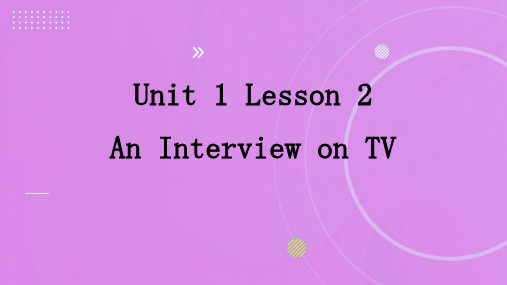
Homework
1. Recite the words and phrases. 2. Talk about your English learning experience.
Unit 1 Lesson 2 An Interview on TV
学习目标
1. Learn about the key words. 2. Learn about simple past tense questions
and short answers. 3. Talk about your English learning experience.
e.g. Did you go to the beach?
Make a report.
Report about the things your classmates did last summer vacation.
e.g. During last summer vacation, Ethan rode his bike. He visited some friends. He also ate some strange food. He …
新课学习
-When did you begin learning English? I began learning English from childhood.
When did you begin learning English?
新课学习 -What did you do in your English class?
We used tapes and conversation practice with our English teacher to learn English.
- 1、下载文档前请自行甄别文档内容的完整性,平台不提供额外的编辑、内容补充、找答案等附加服务。
- 2、"仅部分预览"的文档,不可在线预览部分如存在完整性等问题,可反馈申请退款(可完整预览的文档不适用该条件!)。
- 3、如文档侵犯您的权益,请联系客服反馈,我们会尽快为您处理(人工客服工作时间:9:00-18:30)。
No.
3. What did she do in her Chinese class?
listening
writing reading
played games watched TV
4. Did she like her teacher?
第二章
新知导入
添加标题内容 please add the title here
pre-listening
Choose the correct words to complete the sentences. 要求:独立完成;师友交流;全班展示
1. She speaks English very well. Her _sp_e_a_k_in_g_/_p_ro_n_u_n_c_ia_t_io_n_ is quite good. 2. He is learning to write Chinese ___c_h_a_ra_c_t_er_s___. 3. Sometimes _g_r_a_m_m_a_r_/p_r_o_n_u_n_c_ia_t_io_n_ rules are hard to remember. 4. I just read an interesting ____pa_s_s_a_ge____ in an old book. 5. We had a long ___co_n_s_e_rv_a_t_io_n___ about the interview on the Internet.
第一章
学习目标
添加标题内容 please add the title here
Step 2
学习目标
1. Learn about the key words. 2. Learn about simple past tense questions and short answers. 3. Talk about your English learning experience.
Байду номын сангаас
speaking
Yes.
添加标题内容 please add the title here
Listen to the second part of the interview and complete the notes about James.
Reason
Chinese characters looked interesting.
添加标题内容 please add the title here
Unit 1 Television
Lesson 2 An Interview on TV
北师大版八年级英语上册课件
添加标题内容 please add the title here
目录
学习目标
新知导入
新知解析
拓展练习
添加标题内容 please add the title here
In China
le_a_r_n__t_o_r_e_a_d__ long passages and Chinese characters
添加标题内容 please add the title here
Post-listening
Listen to the whole interview and write Tina, James or Tina & James in each blank.
1. _T_i_n_a_ didn’t speak any Chinese before 2008. 2. _T_i_n_a_ learned some Chinese from games and TV. 3. _J_a_m__e_s began learning Chinese at university. 4._T_i_n_a__&__J_a_m__e_sthink(s) Chinese writing is difficult.
3. To be able to act out the dialogue.
添加标题内容 please add the title here
pre-listening
Do you know what to learn when you learn a language?
添加标题内容 please add the title here
Learning experience
In the US
e_n__jo_y_e_d__ Chinese class, __h_e_l_p_e_d_ him understand Chinese pinyin, _g_r_a_m__m_a_r_, pronunciation and simple
conversations
添加标题内容 please add the title here
Warm up
Is learning a language difficult?
添加标题内容 please add the title here
Look at the key words. Listen and read.
Key words: Language learning characters, conversation, grammar, listening, passage, pronunciation, reading, speaking, vocabulary, writing
添加标题内容 please add the title here
Period 1
Studying aims
1. To be able to say out some vocabularies about language learning.
2. To be able to get some information about language learning experience by listening to an interview.
添加标题内容 please add the title here
while-listening
Listen to the first part of the interview and answer the questions.
1. When did Tina come to Beijing? In 2008.
